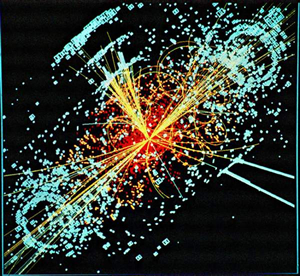The Large Hadron Collider

The Large Hadron Collider (LHC) is the world's largest and highest-energy particle accelerator complex, intended to collide opposing beams of protons or lead, two of several types of hadrons, at up to 99.99 percent the speed of light.
The LHC was built by the European Organization for Nuclear Research (CERN), and lies underneath the Franco-Swiss border between the Jura Mountains and the Alps near Geneva, Switzerland. It is funded by and built in collaboration with over 10,000 scientists and engineers from over 100 countries as well as hundreds of universities and laboratories with the intention of testing various predictions of high-energy physics, including the existence of the hypothesized Higgs boson.
The LHC was built by the European Organization for Nuclear Research (CERN), and lies underneath the Franco-Swiss border between the Jura Mountains and the Alps near Geneva, Switzerland. It is funded by and built in collaboration with over 10,000 scientists and engineers from over 100 countries as well as hundreds of universities and laboratories with the intention of testing various predictions of high-energy physics, including the existence of the hypothesized Higgs boson.
Large Hadron Collider -- Chalk Talk - NSF video

Are The Experiments Planned at the LHC Safe?
Could experiments at the Large Hadron Collider produce a man-made black hole? Is the LHC a doomsday device?
What types of phenomena could result from the world's most powerful experiments?
Strangelets
Microscopic black holes
Vacuum bubbles
Magnetic monopoles
Bose supernovas
Although I tried to understand strangelets, vacuum bubbles and the other objects that physicists speculate could result from LHC experiments, it is darn near impossible to find extra research time during the NASCAR season.
With my limited knowledge of physics, I have no choice but to put my trust in the majority of scientists that have stated there is no risk of LHC experiments creating man-made black holes or strangelets that will devour the Earth.
The problem is that there may not be a scientist anywhere that knows with certainty what to expect from these unprecedented experiments. As far as I can tell, physicists around the world do not agree on a single "theory of everything", and our current laws of physics do not exactly fit the quantum world. Scientists are anxiously awaiting the LHC experiments to help them find those answers.
I read in one of the articles linked below, that "we need the LHC experiments because there has not been a significant breakthrough in physics in over 30 years". My question is, what's the rush? Why can't we wait for the next Newton or Einstein to come along to develop theories that could more accurately predict the outcome of these experiments?
I would feel much more at ease if physicists could say, "So and so is what we expect to happen and these tests will prove it."
Instead of, "If string theory is correct, we should see... If not, maybe we'll find..."
or
"Strangelet production is therefore less likely..."
If and less likely should never be in the same article as doomsday.
Unfortunately, the people at the LHC do not seem overly concerned about my fears. If they were, they could have started out by calling the project something a little less ominous like--The Big Hadron Get Together. They also could have hired a spin doctor, like the politicians do, to soften the blow when mishaps occur. The headline 'Magnet Meltdown at the LHC', could have read 'Proton Party Gathers Steam'. I wouldn't be any safer, but I would sleep better.
What I find most unsettling, is that technologies like the Large Hadron Collider, nanotechnology and biotechnology, are moving forward at near-light speed, whether I feel they are dangerous to humanity or not--and for the record, I do.
No comments:
Post a Comment